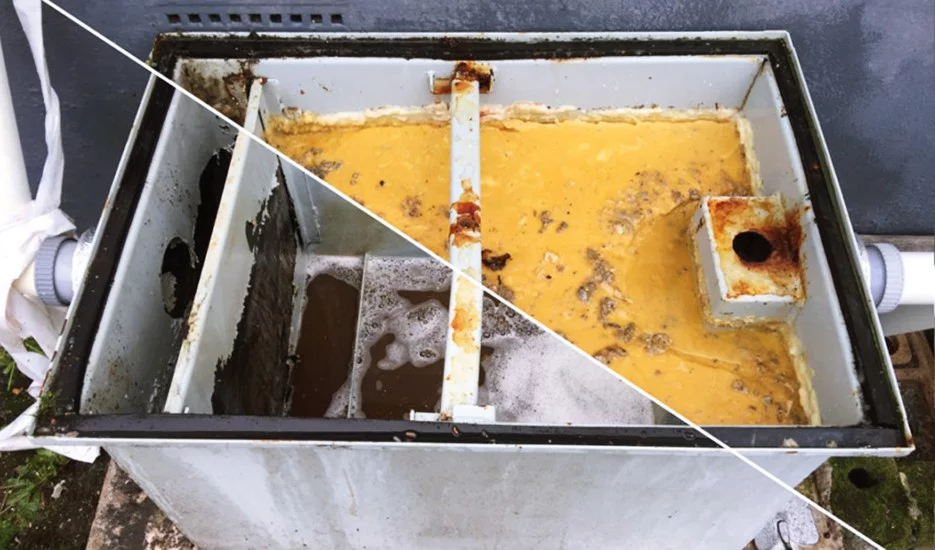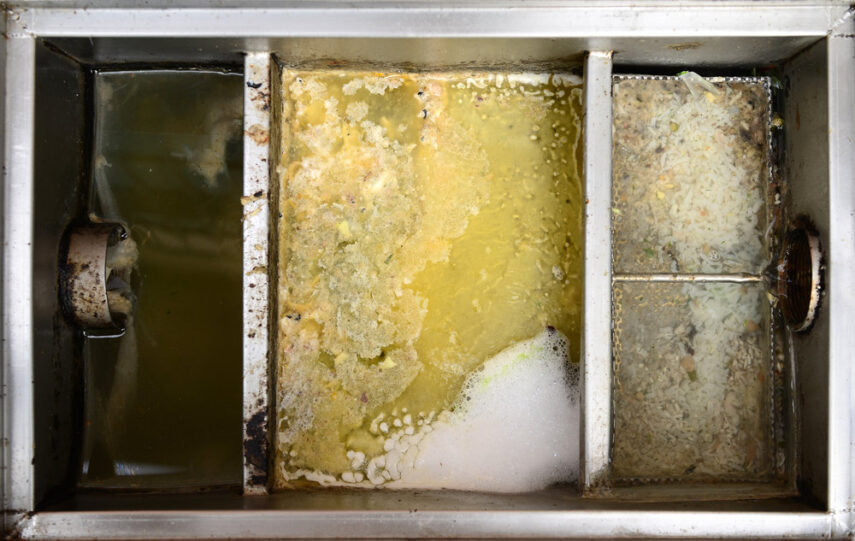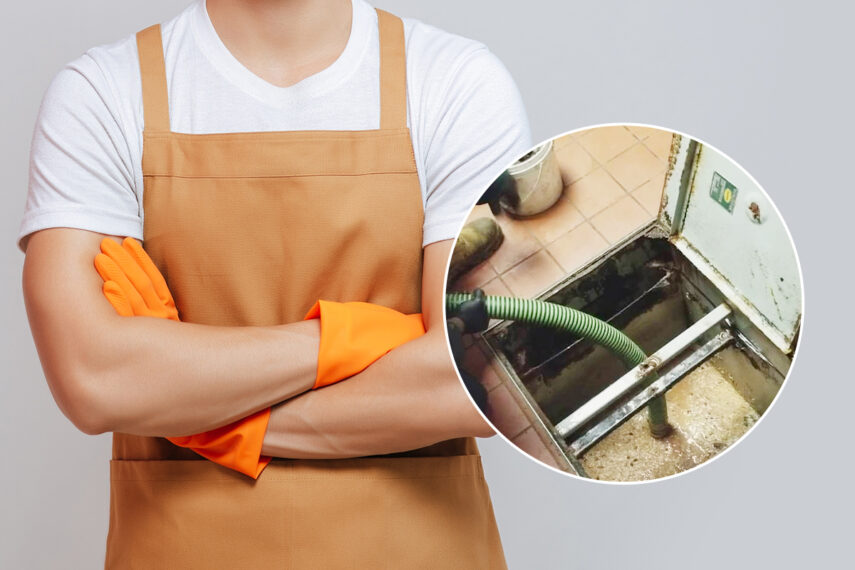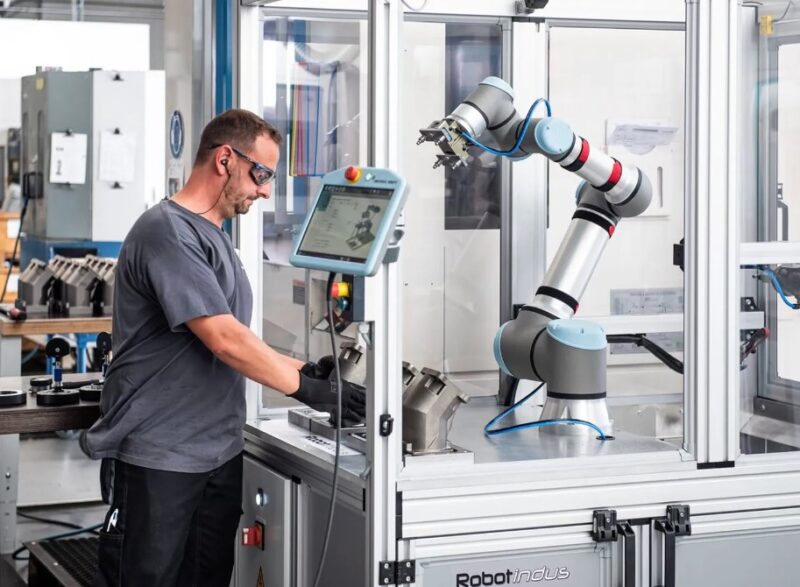Grease traps are essential components of commercial kitchens, preventing the buildup of grease and other fats in drain pipes and thus preserving the health of your drainage system. Cleaning them properly is an important part of regular maintenance to ensure they keep functioning at an optimum level.
While it may seem daunting, with the right knowledge and a little effort, anyone can clean a grease trap.
Here are some tips for properly cleaning a grease trap:
After learning about grease traps, feel free to contact the team at Diamondback Plumbing for all of your commercial plumbing needs.
What exactly is a grease trap and what does it do?

As the name implies, grease traps are used to prevent the buildup of grease and other fats in drain pipes, as well as protecting the health of your drainage system.
Grease traps also help to keep plumbing fixtures and drains running efficiently, especially in restaurants that regularly use deep fryers and griddles. By trapping and separating fats, oils, and greases from wastewater, it helps ensure that the water is safe for disposal.
Regular cleaning of grease traps is one of the most important steps in achieving this goal. When a grease trap is not properly maintained, an accumulation of solid particles can lead to clogged pipes and slow drainage.
This can result in unpleasant odors, standing water on floors or sidewalks, or even overflowing sewage. It can also attract pests such as flies or rodents due to its unpleasant aroma.
In addition to preventing these issues from occurring, regular maintenance of your grease trap will help reduce repair costs associated with any potential damage due to improper upkeep.
Aside from ensuring proper maintenance, it is also important to adhere to local regulations regarding grease trap installation and usage. Different states have different requirements related to how much waste must be captured by the trap before being discharged into any public sewer systems.
Additionally, these guidelines may specify how often the traps must be emptied or inspected depending on the size of the facility they’re serving. For example restaurants with larger kitchens may need their grease traps cleaned more frequently than smaller establishments do.
All in all, having a properly installed and maintained grease trap is an essential part of keeping any commercial kitchen in good working order while preserving safety standards at all times by preventing hazardous materials from entering public sewer systems or polluting local bodies of water near your business’s location.
9 tips for cleaning a grease trap

Is your grease trap clogged? Do you need to clean out your old grease trap? That’s ok!
Here are some useful tips that you can try if you want to clean out your grease trap:
- Wear high-quality protective gear such as gloves and a face mask when cleaning out your dirty grease trap.
- Carefully remove the lid of the grease trap and set it aside in a safe place for future use.
- Use a long-handled brush to scrub away any built-up grease or other debris from the sides, bottom, and top of the grease trap.
- Try using hot water instead of cold water when flushing out your system; this can help dissolve more stubborn deposits that may be present in your system’s pipes or inside the tank itself.
- After you have finished cleaning, replace all parts of your system securely before turning on any taps again to ensure everything is functioning properly.
- Make sure to dispose of all materials used while cleaning safely by following local regulations and guidelines.
- Keep a watchful eye on your local weather forecast since heavy rain could cause an overflow if you haven’t cleaned out your traps regularly enough.
- Make sure to perform regular maintenance checks on your drainage systems by checking them once every two months.
- It’s recommended that you hire professionals if you feel uncomfortable attempting to clean it yourself due to safety reasons.
Should you clean your grease trap by yourself or hire a professional?

If you feel uncomfortable attempting the job on your own, you should opt for professional plumbing assistance. Professionals will have the correct equipment, safety gear, and knowledge to get the job done in an efficient manner.
Additionally, they can provide advice on how best to maintain your grease traps while keeping up with local regulations and guidelines. Hiring a professional may be more costly than doing it yourself but it is often worth it in order to ensure that everything is done correctly for maximum efficiency.
9 tips to properly clean grease traps — Conclusion
Regularly cleaning your grease trap is essential for keeping it in good working order and preventing hazardous materials from entering public sewers or polluting local bodies of water. With the right protective gear, proper maintenance checks, and a bit of know-how, business owners can easily clean their traps themselves following our 9 tips above.
However, if you feel uncomfortable attempting to do this yourself due to safety reasons then hiring a professional plumber may be the best option as they will have all the necessary equipment and knowledge needed to get the job done efficiently while adhering to local regulations.
Ultimately, no matter which route you choose – regular cleaning of your grease trap is key for preserving its functionality and avoiding costly repairs down the road!
Related Posts:
- What to Do if Apple Mouse Is Not Working Properly
- Does CBD Oil Expire? Ways to Store Your CBD Products…
- How To Properly Prepare And Store Holle Goat Stage 1 Formula
- 8 Tips for Watching Free Movies on Xbox One - 2024 Guide
- 5 Tips For Using Digital Signage For Workplace…
- 12 Easy Mirrorless Camera Tips to Help You Become a…







